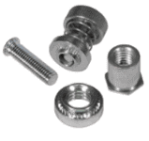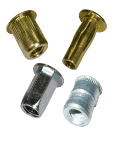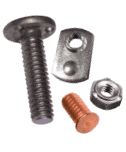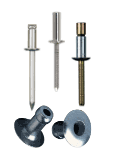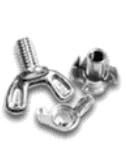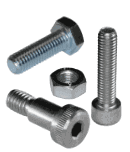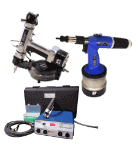What are Rivet Nuts Used For?
March 6, 2024
Rivet nuts, commonly known as nutserts or blind rivet nuts, are an ingenious fastening solution that plays a vital role in various industries. These unique fasteners offer the functionality of a nut, providing a reliable threaded insert in materials that are too thin to support a standard tapped hole. Understanding their wide range of applications across different sectors highlights their versatility and importance.
What are Rivet Nuts?
Rivet nuts are specialized fasteners designed for easy installation into a blind hole from one side of the workpiece. This is particularly useful in situations where access to both sides of the material is restricted. Rivet nuts come standard in different materials such as steel, stainless steel, aluminum, and sometimes other exotic materials like Monel, each suited to specific environments and strength requirements. Their designs vary from small, large or countersunk flanges, smooth or ribbed bodies, half-hex or full-hex shapes, swage style, and slotted/straight shank and slotted/bulbed body types to cater to diverse application needs.
Industry Applications of Rivet Nuts
- Aerospace: In the aerospace industry, where weight and accessibility are crucial factors, rivet nuts allow for secure fastening in aircraft interiors and components. Their lightweight nature, particularly aluminum and titanium variants, is beneficial in reducing overall aircraft weight.
- Automotive Industry: Rivet nuts are widely used in automotive manufacturing for attaching components to thin-walled sections like car body panels, chassis, and engine mounts. They provide strong threads in metal sheets where welding may not be feasible.
- Construction: In metal building fabrication, rivet nuts are used for attaching fixtures, roofing elements, and fittings. They provide a secure anchoring point on thin metal surfaces commonly found in modern construction.
- Electronics: For electronic enclosures and assemblies, especially in computer and consumer electronics, rivet nuts offer a secure method to attach components in limited spaces without compromising the integrity of thin materials.
- Furniture Manufacturing: In the assembly of flat-pack furniture, rivet nuts facilitate easy and quick assembly for end-users, providing sturdy and reliable fastening points.
- Heavy Machinery: In the construction and agricultural machinery sectors, rivet nuts are used to attach panels, guards, and components to metal frames. Their strength and ease of installation make them a preferred choice for heavy equipment manufacturing.
- HVAC Systems: For the installation of heating, ventilation, and air conditioning systems, rivet nuts provide robust anchor points in ductwork and equipment mounting, ensuring secure and long-lasting installations.
- Marine Applications: The marine environment requires corrosion-resistant materials, making stainless steel rivet nuts ideal for fittings, repairs, and assemblies on boats and ships.
- Medical Equipment: For medical devices and hospital equipment, where precision and reliability are paramount, rivet nuts offer secure and clean, hermetically sealed solutions for assembling various components, particularly in devices with thin metal casings.
- Railway Industry: In railway carriages and infrastructure, rivet nuts ensure secure fastening in metal components where welding is impractical. Their vibration-resistant properties make them ideal for the dynamic and often harsh conditions of railway applications.
- Renewable Energy: Rivet nuts are increasingly used in the renewable energy sector, particularly in solar panel frames and wind turbine assemblies. They offer a secure and durable method for assembling and maintaining renewable energy infrastructure.
- Telecommunications: Used in the assembly of communication towers and equipment, rivet nuts provide reliable fastenings in environments where durability and resistance to vibration are essential.



